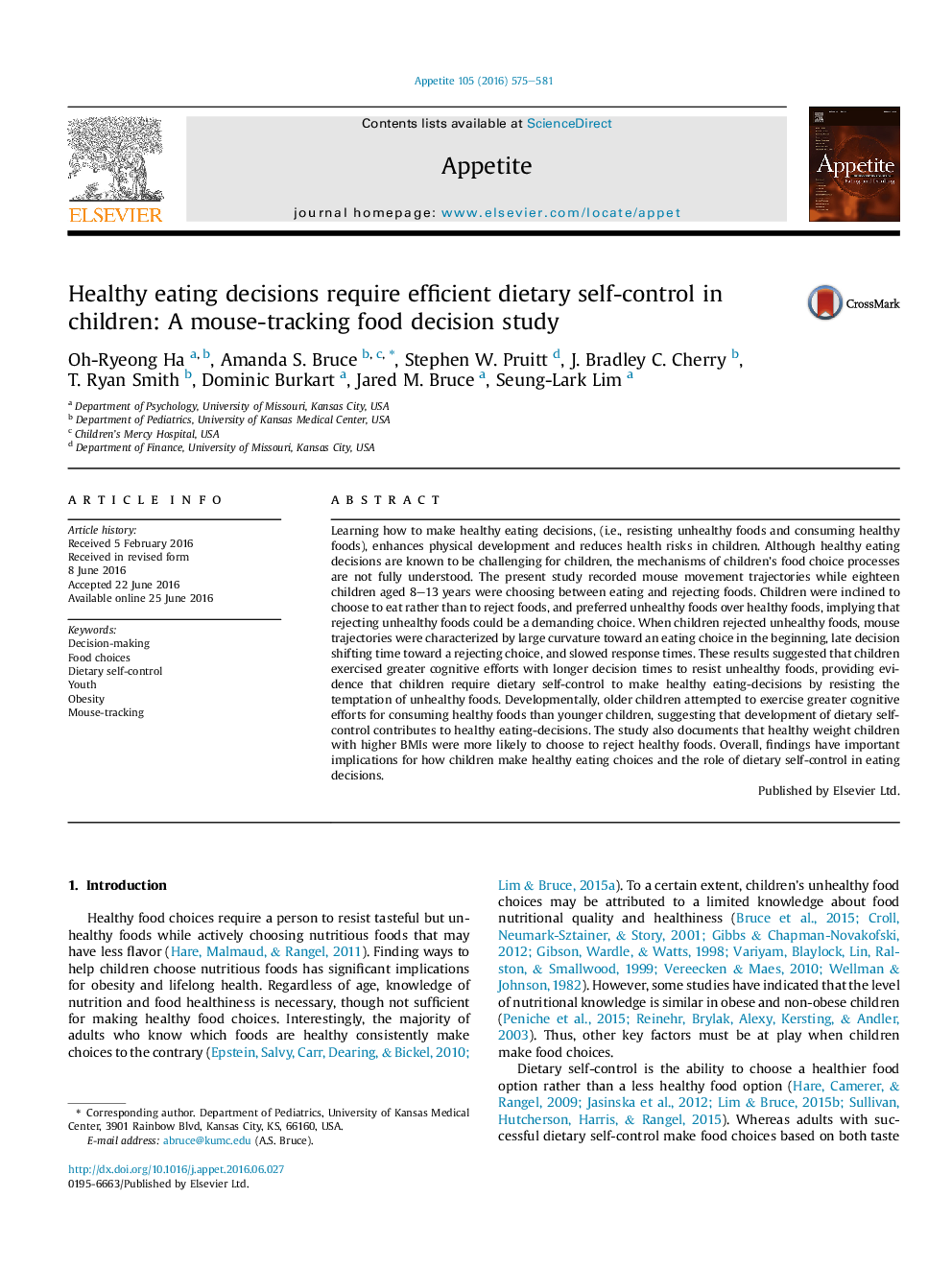| کد مقاله | کد نشریه | سال انتشار | مقاله انگلیسی | نسخه تمام متن |
|---|---|---|---|---|
| 7307219 | 1475375 | 2016 | 7 صفحه PDF | دانلود رایگان |
عنوان انگلیسی مقاله ISI
Healthy eating decisions require efficient dietary self-control in children: A mouse-tracking food decision study
ترجمه فارسی عنوان
تصمیمات تغذیه سالم نیاز به کنترل خودکامه در کودکان دارد: تصمیم گیری درباره تصمیم گیری در مورد رژیم غذایی
دانلود مقاله + سفارش ترجمه
دانلود مقاله ISI انگلیسی
رایگان برای ایرانیان
کلمات کلیدی
تصمیم سازی، انتخاب غذا، خود کنترل رژیم غذایی، جوانان، چاقی، ردیابی ماوس،
ترجمه چکیده
یادگیری نحوه تصمیم گیری در مورد خوردن سالم (به عنوان مثال، مقاومت در برابر غذاهای ناسالم و مصرف غذاهای سالم)، پیشرفت جسمانی را افزایش می دهد و خطرات سلامتی در کودکان را کاهش می دهد. اگر چه تصمیمات تغذیه سالم برای کودکان چالش برانگیز است، مکانیسم فرآیند انتخاب غذای کودکان به طور کامل درک نمی شود. در مطالعه حاضر، مسیرهای حرکات موش ثبت شد، در حالیکه هجده کودک در سن 8 تا 13 سالگی بین غذا خوردن و رد شدن غذا انتخاب شدند. کودکان تمایل به خوردن غذا را داشتند و غذاهای ناسالم را بیش از غذاهای سالم ترجیح می دادند، و این بدین معنی است که رد کردن غذاهای ناسالم می تواند یک انتخاب سخت باشد. هنگامی که کودکان غذاهای ناسالم را رد کردند، مسیرهای ماوس با انحنای بزرگ به سوی انتخاب غذا در ابتدا، زمان تغییر تصمیم گیری در اواخر به سمت انتخاب رد شد و زمان پاسخ آهسته مشخص شد. این نتایج نشان می دهد که کودکان با تلاش های طولانی مدت برای مقاومت در برابر غذاهای ناسالم تلاش های شناختی بیشتری را انجام می دهند و شواهدی ارائه می دهند که کودکان با کنترل مقاومت غذایی در معرض ابتلا به مواد غذایی ناسالم به کنترل خود غذا می پردازند. در در حال توسعه، کودکان مسن تلاش بیشتری برای مصرف غذاهای سالم از کودکان جوانتر انجام دادند، که نشان می دهد توسعه کنترل خود رژیم غذایی در تصمیم گیری در مورد خوردن سالم کمک زیادی می کند. این مطالعه همچنین نشان می دهد که کودکان وزن سالم با شاخص های شاخص توده بدنی بیشتر احتمال دارد که غذاهای سالم را رد کنند. به طور کلی، یافته ها پیامدهای مهمی برای چگونگی انتخاب غذاهای سالم و نقش کنترل خود در رژیم غذایی در تصمیم گیری های غذایی دارند.
موضوعات مرتبط
علوم زیستی و بیوفناوری
علوم کشاورزی و بیولوژیک
دانش تغذیه
چکیده انگلیسی
Learning how to make healthy eating decisions, (i.e., resisting unhealthy foods and consuming healthy foods), enhances physical development and reduces health risks in children. Although healthy eating decisions are known to be challenging for children, the mechanisms of children's food choice processes are not fully understood. The present study recorded mouse movement trajectories while eighteen children aged 8-13 years were choosing between eating and rejecting foods. Children were inclined to choose to eat rather than to reject foods, and preferred unhealthy foods over healthy foods, implying that rejecting unhealthy foods could be a demanding choice. When children rejected unhealthy foods, mouse trajectories were characterized by large curvature toward an eating choice in the beginning, late decision shifting time toward a rejecting choice, and slowed response times. These results suggested that children exercised greater cognitive efforts with longer decision times to resist unhealthy foods, providing evidence that children require dietary self-control to make healthy eating-decisions by resisting the temptation of unhealthy foods. Developmentally, older children attempted to exercise greater cognitive efforts for consuming healthy foods than younger children, suggesting that development of dietary self-control contributes to healthy eating-decisions. The study also documents that healthy weight children with higher BMIs were more likely to choose to reject healthy foods. Overall, findings have important implications for how children make healthy eating choices and the role of dietary self-control in eating decisions.
ناشر
Database: Elsevier - ScienceDirect (ساینس دایرکت)
Journal: Appetite - Volume 105, 1 October 2016, Pages 575-581
Journal: Appetite - Volume 105, 1 October 2016, Pages 575-581
نویسندگان
Oh-Ryeong Ha, Amanda S. Bruce, Stephen W. Pruitt, J. Bradley C. Cherry, T. Ryan Smith, Dominic Burkart, Jared M. Bruce, Seung-Lark Lim,
